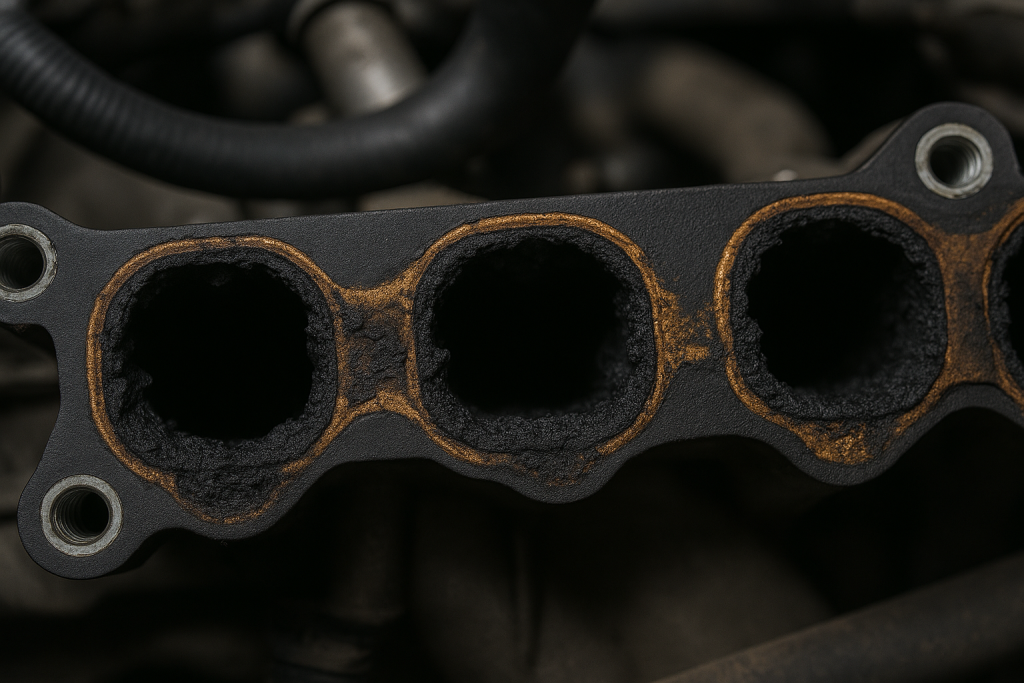When your diesel engine isn’t performing as it should, a clogged intake manifold could be the culprit. This essential component plays a critical role in the combustion process, delivering the air your engine needs to run smoothly. Over time, however, carbon deposits and debris can restrict airflow, leading to noticeable performance issues. In this guide, we’ll explore the key symptoms of a blocked intake manifold, the causes, and how you can prevent or fix the problem to keep your diesel vehicle in top shape.
Key Summary
- A clogged intake manifold in diesel engines can cause reduced power, increased fuel consumption, rough idling, black smoke, and warning lights.
- Common causes include carbon build-up, EGR system issues, and poor maintenance.
- Ignoring the issue can result in long-term engine damage and higher fuel costs.
- Solutions include professional cleaning, using quality fuel, and regular servicing to prevent blockage.
Symptoms of a Blocked Intake Manifold
- Reduced Engine Performance
A clogged intake manifold restricts airflow, which reduces the engine’s ability to generate power. You may notice sluggish acceleration, a lack of responsiveness, or difficulty reaching higher speeds. - Increased Fuel Consumption
When airflow is restricted, the engine compensates by consuming more fuel. If you’ve noticed a significant drop in fuel efficiency, it’s worth investigating the intake manifold. - Rough Idling or Stalling
An uneven supply of air can cause the engine to idle roughly or even stall at low speeds. This symptom is particularly noticeable during cold starts. - Excessive Black Smoke from the Exhaust
A blocked intake manifold can result in an incomplete combustion process, leading to thick, black smoke from the exhaust. This is a tell-tale sign that your diesel engine isn’t burning fuel efficiently. - Check Engine Light Activation
Modern diesel vehicles are equipped with sensors that monitor air intake and emissions. A clogged manifold can trigger the Check Engine Light, indicating a problem that needs immediate attention.
Common Causes of Intake Manifold Blockage
- Carbon Build-Up from Exhaust Gases
Diesel engines often recirculate exhaust gases through the EGR (Exhaust Gas Recirculation) system to reduce emissions. Over time, this process can lead to carbon deposits forming inside the intake manifold. - Poor Maintenance Habits
Skipping regular servicing, such as oil changes or air filter replacements, can accelerate carbon accumulation and restrict airflow. - EGR System Issues
A malfunctioning EGR valve can increase the amount of soot entering the intake manifold, leading to faster blockages.
The Risks of Ignoring the Problem
Failing to address a clogged intake manifold can lead to:
- Long-Term Engine Damage: Restricted airflow forces the engine to work harder, which can wear out components prematurely.
- Higher Fuel Costs: Poor fuel efficiency will cost you more at the pump.
- Increased Repair Bills: Ignoring symptoms can turn a simple cleaning job into a costly repair or replacement.
Solutions and Maintenance Tips
- Professional Cleaning and Repairs
If your intake manifold is clogged, a professional mechanic can perform a thorough cleaning to restore airflow and engine performance. - Use High-Quality Fuel and Additives
Using premium diesel fuel and additives can reduce soot build-up and keep your intake manifold cleaner for longer. - Regular Inspections and Servicing
Routine inspections of the intake system, EGR valve, and air filters can help catch potential problems early.
Preventative Maintenance to Avoid Clogs
- Keep the EGR System Clean: Regular cleaning of the EGR valve reduces the amount of soot entering the intake manifold.
- Change Oil and Air Filters Regularly: Dirty oil and clogged filters contribute to carbon build-up. Stick to your vehicle’s recommended maintenance schedule.
- Invest in Professional Diagnostics: Having your diesel vehicle inspected by professionals ensures that any airflow issues are detected and resolved early.
Conclusion
A clogged intake manifold can severely impact your diesel engine’s performance and efficiency. Recognising the symptoms early—like reduced power, increased fuel consumption, or black smoke—can save you from costly repairs down the road. With regular maintenance, quality fuel, and professional inspections, you can keep your diesel vehicle running smoothly and reliably.
This guide is written by BB Garage, a trusted specialist in diesel vehicle maintenance and repair. Let us help you keep your engine in peak condition. Contact us today!

